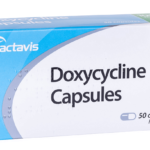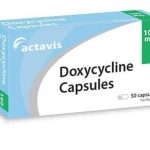What Happens If You Take Expired Doxycycline?

The three main attributes of drug quality are identity, strength, and purity. Drug safety monitoring mitigates adverse drug reactions caused by therapeutic drugs. It involves identifying expected and unexpected adverse reactions resulting from the use of medicines.
Medication quality assurance systems play a critical role in reaching treatment goals by ensuring the quality of essential medicines, helping to deliver effective treatments that lead to less illness, and resulting in health care savings that can be reinvested towards improving other aspects of health and wellness.
What is doxycycline?
Doxycycline is used to treat many different bacterial infections, such as acne, urinary tract infections, intestinal infections, respiratory infections, eye infections, gonorrhea, chlamydia, syphilis, periodontitis (gum disease), and others.
Doxycycline works by stopping the growth of bacteria when treating bacterial infections and is also thought to have an anti-inflammatory action when used for other conditions. Doxycycline is a tetracycline antibiotic.
Some forms of doxycycline are used to prevent malaria, treat anthrax, or treat infections caused by mites, ticks, or lice. Doxycycline oral tablet is available as both a generic and brand-name drug. Brand names: Acticlate, Doryx, Doryx MPC.
Doxycycline comes in three oral forms: a tablet, a capsule, and a suspension. It also comes as a solution for injection, which is only given by a healthcare provider.
How should doxycycline be taken?
Doxycycline comes as a capsule, tablet, delayed-release tablet, and suspension (liquid) to take by mouth. Doxycycline is usually taken once or twice a day. Drink a full glass of water with each dose. If your stomach becomes upset when you take doxycycline, you may take it with food or milk. Talk with your doctor or pharmacist about the best way to take doxycycline. Follow the directions on your prescription label carefully, and ask your doctor or pharmacist to explain any part you do not understand. Take Doxycycline exactly as directed. Do not take more or less of it or take it more often than prescribed by your doctor.
Swallow the delayed-release tablets whole; do not split, chew, or crush them.
If you cannot swallow certain delayed-release tablets (Doryx; generics) whole, carefully break up the tablet and sprinkle the contents of the tablet on a spoonful of cold or room temperature (not hot) applesauce. Be careful not to crush or damage any of the pellets while you are breaking up the tablet. Eat the mixture right away and swallow without chewing. If the mixture cannot be eaten right away, it should be discarded.
Shake the suspension well before each use to mix the medication evenly.
If you are taking doxycycline for the prevention of malaria, start taking it 1 or 2 days before traveling to an area where there is malaria. Continue taking doxycycline each day you are in the area, and for 4 weeks after leaving the area. You should not take doxycycline for the prevention of malaria for more than 4 months.
Continue to take doxycycline even if you feel well. Take all the medication until you are finished unless your doctor tells you otherwise.
One doxycycline product may not be able to be substituted for another. Be sure that you receive only the type of doxycycline that was prescribed by your doctor. Ask your pharmacist if you have any questions about the type of doxycycline you were given.
Does Doxycycline expire?
Yes, doxycycline can expire, the expiration date on doxycycline is the final day that the manufacturer guarantees the full potency and safety of a medication. Drug expiration dates exist on most medication labels, including prescription, over-the-counter (OTC), and dietary (herbal) supplements.
According to the FDA, drug expiration dates reflect the time period during which the product is known to remain stable, which means it retains its strength, quality, and purity when it is stored according to its labeled storage condition. In the late 1970s, the United States Food and Drug Administration (FDA) mandated that all prescription and over-the-counter (OTC) medical products contain an expiration date. Expiration dates for medicines are often marked “EXP” and are printed on the label or stamped onto the medicine bottle or box.
However, a study conducted by the U.S. military shows that some medications could retain their potency up to one year after the expiration date has passed hence the practice of using doxycycline after its shelf life has passed.
Can expired doxycycline cause kidney damage?
Yes, compromise on the quality of pharmaceutical products would mean a compromise on the overall health of the patients and other clients. It is a well-known fact that good quality products are much more efficient and effective.
Studies have reported that even unexpired doxycycline can affect kidney function, especially in patients with impaired renal function. For most people, doxycycline is considered a safe broad-spectrum antibiotic. Although doxycycline possesses many of the metabolic properties of the tetracycline group, toxic blood levels usually do not occur because of the drug’s unique extrarenal route of excretion.
What happens if you take expired doxycycline?
A lot of things can go wrong when you take expired doxycycline including the development of resistance. This is because increases in antibiotic resistance are driven by a combination of germs exposed to antibiotics and the spread of those germs and their mechanisms of resistance. If the antibiotic concentration is lower than what is needed to kill or inhibit the growth of bacteria, there may be room for resistance to develop and be selected, as has been observed in many microbes.
In addition, taking expired doxycycline exposes you to an increased risk of adverse events and side effects.
The more common side effects of doxycycline can include:
• loss of appetite
• nausea and vomiting
• diarrhea
• rash
• sensitivity to the sun
• hives
• temporary discoloring of adult teeth (goes away with dentist cleaning after the drug is stopped)
If these effects are mild, they may go away within a few days or a couple of weeks. If they’re more severe or don’t go away, talk to your doctor or pharmacist.
Serious side effects
Call your doctor right away if you have serious side effects. Call 911 if your symptoms feel life-threatening or if you think you’re having a medical emergency. Serious side effects and their symptoms can include the following:
• Antibiotic-associated diarrhea. Symptoms can include:
o severe diarrhea
o bloody diarrhea
o stomach cramping and pain
o fever
o dehydration
o loss of appetite
o weight loss
• High blood pressure inside your skull. Symptoms can include:
o headache
o blurry vision
o double vision
o vision loss
• Irritation of your esophagus or ulcers in your esophagus (may be more likely if you take your dose at bedtime). Symptoms can include:
o burning or pain in your chest
• Anemia
• Pancreatitis. Symptoms can include:
o pain in your upper abdomen, or pain in your abdomen that moves to your back or gets worse after you eat
o fever
• Serious skin reactions. Symptoms can include:
o blisters
o peeling skin
o a rash of small purple spots
Important warnings
• Permanent change of tooth color warning: This drug may cause permanent changes in tooth color in children if it’s used during tooth development. This time includes the last half of pregnancy through 8 years of age. Children’s teeth may change to yellow, gray, or brown.
• Antibiotic-associated diarrhea warning: This drug may cause antibiotic-associated diarrhea. This can range from mild diarrhea to severe infection of the colon. In rare cases, this effect can be fatal (cause death). If you have severe or persistent diarrhea, tell your doctor. They may stop your treatment with this drug.
• Intracranial hypertension warning: This drug may cause intracranial hypertension or high blood pressure inside your skull. Symptoms may include headache, blurry vision, double vision, and vision loss. Tell your doctor right away if you have these symptoms. You may also have swelling inside of your eyes. Women of childbearing age who are overweight have a higher risk of this condition. If you’ve had intracranial hypertension before, your risk is also higher.
• Severe skin reaction warning: This drug can cause serious skin reactions. These include conditions called Stevens-Johnson syndrome, toxic epidermal necrolysis, and drug reaction with eosinophilia and systemic symptoms (DRESS). Symptoms can include blisters, peeling skin, and a rash of small purple spots. If you have any of these symptoms, stop taking this drug and call your doctor right away.
• Reversible delayed bone growth: This drug may prevent bone growth in children if taken by the mother during the second and third trimester of pregnancy. It may also prevent bone growth in children if taken up to the age of 8 years. This delayed bone growth is reversible after stopping the drug.
• Photosensitivity warning: This drug may cause your skin to be more sensitive to sunlight than it usually is. Having exposure to sunlight for short periods of time may cause skin rash, itching, redness, or severe sunburn. If you’re taking this drug, try to stay out of direct sunlight. If you can’t, be sure to apply sunscreen and wear protective clothing.





